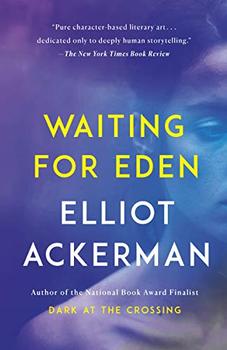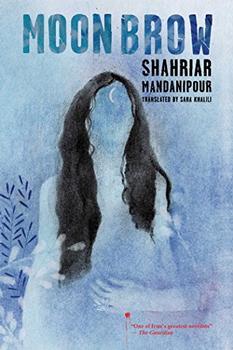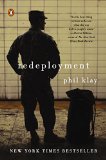Summary | Excerpt | Reading Guide | Reviews | Beyond the book | Read-Alikes | Genres & Themes | Author Bio

Elliot Ackerman's latest novel, Waiting for Eden, follows Marine Eden Malcom as his death approaches due to combat injuries suffered in Iraq. Narrated by Eden's best friend, who states he was "sitting next to Eden and luckier than him when our Humvee hit a pressure plate, killing me and everybody else, him barely surviving," the unnamed ghost waits for his friend to join him in the afterworld. Omniscient, the narrator is aware of Eden's thought processes and discusses what his friend is going through as he lies conscious in his hospital bed, immobile, deaf and nearly blind, as well as the thoughts of those around him. In meditative flashbacks, the ghost recollects his relationship with Eden and Eden's wife Mary, as well as events that brought them all to the current point in time.
It's no surprise that Ackerman was a Marine; his insight into the sacrifices made by service members and their families – during their deployment and, perhaps more importantly, after their return – is remarkable, as is his ability to help his readers understand why these men and women may make the decisions they do and what motivates them. This insider's view of such important topics alone would put Waiting for Eden high on many people's to-read list, but beyond this, Ackerman delves into questions even more central to the human condition: What does it mean to be alive? When is it time to let go? What regrets must we live with? These and other profound questions permeate the work, making it relevant far beyond the scope of a typical war book.
Also impressive is Ackerman's ability to infuse his narrative with incredible realism; he's a keen observer of human nature. At one point during a social interaction he writes that "[Mary] pretended these women didn't know about her, and they pretended back." One of Eden's nurses, a former combat medic, thinks, "He'd watched the minutes he bought for his friends turn into sentences of too many hours, days and months. Soon he learned it wasn't too little time that was the enemy but too much." In another scene Mary contemplates Eden's death: "Mary thought about her husband, and the word imminent, and maybe once this was over, once he'd gone, things would get better for her… Her husband dying would be a good thing… She was ready to say goodbye, thinking of what she wanted to tell him or, if he couldn't hear it, what she wanted to tell herself."
These musings feel so spot-on that readers can't help but understand the sentiments completely, even if they've never been in similar circumstances themselves.
Make no mistake, the novel is a grim one, and there are no answers to these important questions within its pages; its graphic nature may also make it a challenging read for some. Nevertheless, I think it was one of the most haunting narratives I've encountered in a long time, and I've continued to mull it over in the weeks since reading it. It is a powerful and affecting story. I can confidently say that Waiting for Eden is my highest-rated book of the year to-date; its weighty themes make it an especially good choice for group discussion.
![]() This review was originally published in The BookBrowse Review in October 2018, and has been updated for the
October 2019 edition.
Click here to go to this issue.
This review was originally published in The BookBrowse Review in October 2018, and has been updated for the
October 2019 edition.
Click here to go to this issue.

If you liked Waiting for Eden, try these:

by Sara Khalili, Shahriar Mandanipour
Published 2018
From "one of Iran's most important living fiction writers" (The Guardian) comes a fantastically imaginative story of love and war narrated by two angel scribes perched on the shoulders of a shell-shocked Iranian soldier who's searching for the mysterious woman haunting his dreams.

by Phil Klay
Published 2015
Redeployment takes readers to the frontlines of the wars in Iraq and Afghanistan, asking us to understand what happened there, and what happened to the soldiers who returned.
Your guide toexceptional books
BookBrowse seeks out and recommends the best in contemporary fiction and nonfiction—books that not only engage and entertain but also deepen our understanding of ourselves and the world around us.